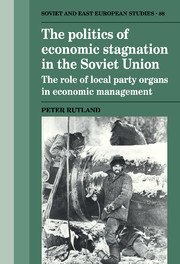 The Politics of Economic Stagnation in the Soviet Union
The Politics of Economic Stagnation in the Soviet Union Book contents
- Frontmatter
- Contents
- List of tables
- Preface
- Glossary of Russian terms and abbreviation
- Introduction: The party in the post-totalitarian system
- 1 The party and the economy: structures and principles
- 2 Party interventions in industry
- 3 Interventions in industry: case studies
- 4 The party as regional coordinator
- 5 Regional coordination: case studies
- 6 The party as fireman: party interventions in the transport and energy sectors
- 7 The role of the party in agriculture
- 8 Non-party control organs
- 9 The principles underlying the party's work with cadres
- 10 The obkom elite in the 1980s
- 11 Party and economy under perestroika
- Conclusion Party and economy in the USSR: from stagnation to collapse
- Appendices
- Notes
- Bibliography
- Index
- THE POLITICS OF ECONOMIC STAGNATION IN THE SOVIET UNION
5 - Regional coordination: case studies
Published online by Cambridge University Press: 06 July 2010
- Frontmatter
- Contents
- List of tables
- Preface
- Glossary of Russian terms and abbreviation
- Introduction: The party in the post-totalitarian system
- 1 The party and the economy: structures and principles
- 2 Party interventions in industry
- 3 Interventions in industry: case studies
- 4 The party as regional coordinator
- 5 Regional coordination: case studies
- 6 The party as fireman: party interventions in the transport and energy sectors
- 7 The role of the party in agriculture
- 8 Non-party control organs
- 9 The principles underlying the party's work with cadres
- 10 The obkom elite in the 1980s
- 11 Party and economy under perestroika
- Conclusion Party and economy in the USSR: from stagnation to collapse
- Appendices
- Notes
- Bibliography
- Index
- THE POLITICS OF ECONOMIC STAGNATION IN THE SOVIET UNION
Summary
This chapter presents two case studies of party organs intervening in territorially defined economic activity: the construction industry and consumer goods production, both of which were the subject of high profile party campaigns in the late 1970s.
Construction activity was self-evidently ‘regional’ in character, in that it had to take place in a particular location. It is not surprising, therefore, to find regional party organs sharing the responsibility for its development. Consumer goods production was not necessarily region-specific, but it developed that way in the USSR, largely because it was placed at the bottom of the central planners' list of priorities. In the past twenty-five years, local party organizations were activated to try to improve consumer goods production in both quantity and quality.
Party organizations saw themselves stepping in where existing state territorial coordination agencies, primarily the Soviets, had failed. However, party organizations also proved unable to bring about any lasting improvement in these sectors, which became increasingly serious bottlenecks in the development of the economy. Beneath all the brouhaha surrounding party interventions in construction and consumer goods, the structural factors which held back their development remained intact.
Party coordination of the construction sector
Construction was an important but often-overlooked sector of the Soviet economy. Rapid growth of the sort the Soviet economy experienced made construction more important than in more mature economies. In 1981, there were 11.3 million employees, working in 32,000 different construction organizations – compared to 37 million industrial workers in 44,600 enterprises.
- Type
- Chapter
- Information
- The Politics of Economic Stagnation in the Soviet UnionThe Role of Local Party Organs in Economic Management, pp. 109 - 122Publisher: Cambridge University PressPrint publication year: 1992


